What Is 3d Design In Art
What is 3D Modeling & What's It Used For?
Tips3D Disclosure: This post may contain affiliate links. That means if you buy something we get a small commission at no extra cost to you(learn more)
3D modeling is a technique in computer graphics for producing a 3D digital representation of any object or surface.
An artist uses special software to manipulate points in virtual space(called vertices) to form a mesh: a collection of vertices that form an object.
These 3D objects can be generated automatically or created manually by deforming the mesh, or otherwise manipulating vertices.
3D models are used for a variety of mediums including video games, movies, architecture, illustration, engineering, and commercial advertising.
The 3D modeling process produces a digital object capable of being fully animated, making it an essential process for character animation and special effects.
The core of a model is the mesh which is best described as a collection of points in space.
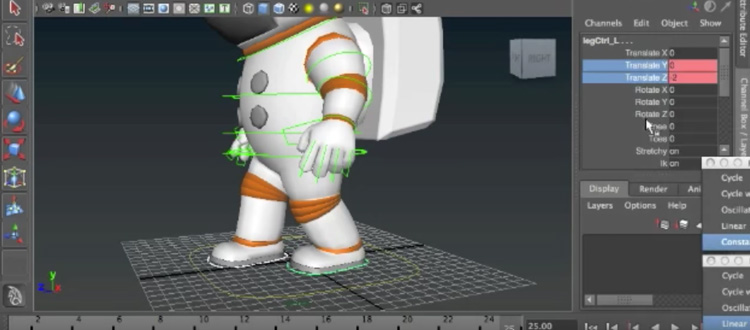
These points are mapped into a 3D grid and joined together as polygonal shapes, usually triangles or quads. Each point or vertex has its own position on the grid and by combining these points into shapes, the surface of an object is created.
Models are often exported to other software for use in games or movies. But some 3D modeling programs allow the creation of a 2D images using a process called 3D rendering. This technique is fantastic for creating hyper-realistic scenes using sophisticated lighting algorithms.
3D Modeling In Action
3D modeling is an integral part of many creative careers.
Engineers and architects use it to plan and design their work. Animators and game designers rely on 3D modeling to bring their ideas to life.
And just about every Hollywood blockbuster uses 3D modeling for special effects, to cut costs, and to speed up production.
For example, the HBO series Game of Thrones uses 3D modelling + animation to mock up every episode before filming.
Because of their value, an extensive market for 3D models exists online.
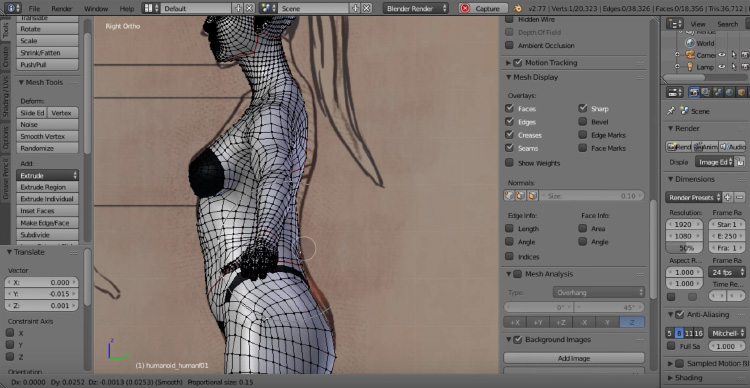
Websites like TurboSquid and CGTrader offer individual 3D models and packages. Artists can work either individually or as a team to create these assets and distribute them for use in a variety of projects.
3D printing is another popular application for 3D modeling as it allows precise control over the design of a mesh.
Objects can also be generated through 3D scanning or sculpting, but those techniques have limitations in the precision of the final model. But what is gained in precision is lost in speed as 3D modeling can be a tedious process.
Learning 3D modeling can be quite a challenge. Many of the programs are complicated and good modeling principles are based on fundamental art skills.
Those with experience in drawing and sculpture will have an easier time learning to model. But really, anyone with time and patience can learn these skills.
How Does 3D Modeling Work?
An artist usually begins by generating some type of primitive like a cube, sphere, or plane. The primitive is just a starting shape to begin modeling.
The artist will build upon this basic form and manipulate it using various modeling tools. For 3D modeling it's almost always a good idea to start simple and work towards complexity.
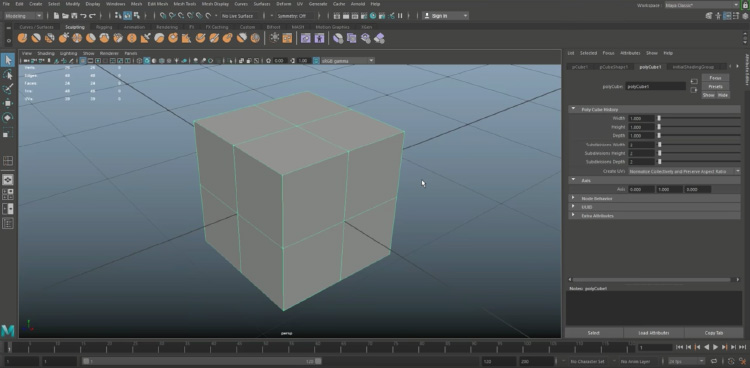
3D modeling is a precise workflow often involving the painstaking placement of individual vertices to achieve the correct contours of the desired object.
The exterior of the mesh is composed of polygons which can be subdivided into smaller shapes to create more detail. These subdivisions are especially necessary if the 3D model is to be animated.
Any joints that need to bend—such as a character's knee or elbow—will need these additional polygons to ensure smooth motion.
Several tools exist to speed up the modeling process. Most programs include a mirroring technique that lets the artist build a symmetrical model by only working on one half—or even one quarter—of the object.
This is especially useful in character design as an artist only needs to model one side of the character and the software will mirror their work along the desired axis creating a perfectly symmetrical object.
Other tools allow for the quick deformation of a model's surface.
For instance, a noise texture can be used to displace the mesh to get a more organic surface.
Or a subdivision surface tool can be used to simulate a higher polygon count. In this way the artist can work "non-destructively" in a process that preservers their original work. This is especially important for more complex models that require experimentation to get right.
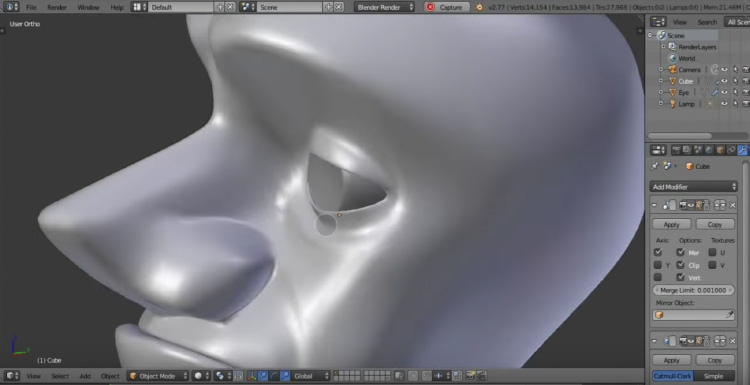
Once the model is complete the surface can be painted and textured.
The texturing of models is beyond the scope of this article, but it is important to note that textures can be used to fake surface details.
In this way an artist can make a model appear more complicated than it is. This technique is especially useful in video games where complicated meshes can prove taxing on a CPU and interrupt the gameplay.
Intro To 3D Modeling Software
There's no shortage of 3D modeling programs to choose from.
Whether you're looking to make animated characters, game models, or design a house, there's a program out there to fit any budget.
Maya by Autodesk is the industry standard in 3D modeling and animation.
If you were to take a 3D modelling course at a university this is probably the software you'd use. Most professional studios look for experience with Maya when hiring new talent, so any artist looking to break into the industry should seriously consider learning Maya.
Cinema4D is another very popular choice.
The learning curve isn't as steep as with Maya and it supports a more streamlined integration with tools like Adobe After Effects, making it an excellent choice for those interested in motion graphics.
Blender is a free and open-source 3D modeling and animation program.
It comes with a robust toolset capable of producing professional-quality assets and animations. No price tag.
Blender's learning curve is quite steep, however, and the software is considered non-standard in the industry.
SketchUp is a tool popular among architects and landscape designers.
It boasts an easy-to-use interface that makes it perfect for beginners looking to get started with 3D modeling for architectural work.
But there are tons of other modeling programs out there so have a look in Google if you're curious to find more.
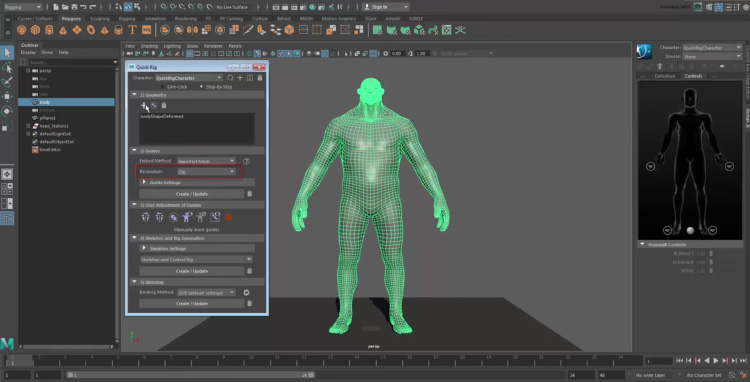
Either way, 3D modeling is an essential part of the modern digital media landscape.
It is also an exciting and rewarding means of artistic self-expression. Though often daunting for beginners, the growing body of tutorials and learning resources means it's never been easier to learn 3D modeling from scratch.
Now is the perfect time to get started on your own journey with modeling and bring your unique ideas to life.
![]()
Author: Josh Petty
Josh is an artist and game developer who specializes in sci-fi, fantasy, and abstract art. His work employs vibrant colors and combines elements of glitch art, outrun, retro-gamming, neo-geo, and conceptual art. He trained as an oil painter before picking up 3D modeling, animation, and programming. He now runs Brain Jar, a small game development studio that focuses on experimental, narrative-driven content. You can learn more on the website or on Twitter @brainjargames.
What Is 3d Design In Art
Source: https://conceptartempire.com/what-is-3d-modeling/
Posted by: hillsomprood.blogspot.com

0 Response to "What Is 3d Design In Art"
Post a Comment